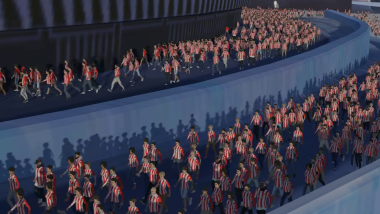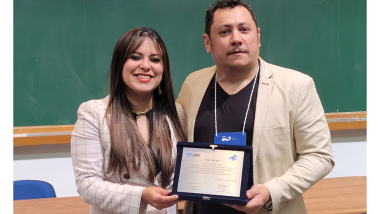Manuel Cañizares defenderá su tesis el miércoles 16 de octubre
- La defensa tendrá lugar en el Salón de Grados de la Facultad de Ciencia y Tecnología del Campus de Leioa
Manuel Cañizares estudió Física y Matemáticas en la Universidad de Sevilla y luego un máster en Física Matemática en la Universidad de Granada. Sus intereses siempre han estado orientados a comprender los fenómenos físicos con rigor matemático. Cañizares trabaja como estudiante de doctorado en el Basque Center for Applied Mathematics (BCAM) en el grupo de investigación de Análisis Armónico y problemas inversos (HA).
Su tesis, titulada Identificación de hamiltonianos cuánticos en presencia de interacciones eléctricas. Un enfoque analítico, está bajo la supervisión de Pedro Caro (BCAM e Ikerbasque).
La defensa está programada para el miércoles 16 de octubre en el Salón de Grados de la Facultad de Ciencia y Tecnología del Campus de Leioa a las 15:00 horas.
En nombre de todos los miembros de BCAM, queremos desearle a Manuel la mejor de las suertes en la defensa de su tesis.
Abstract
In this thesis, we consider two inverse problems motivated by physical models related to quantum mechanics, particularly with the Schrödinger equation. These are the scattering problem with local near-field data and the problem of initial-to-final data in quantum mechanics. In both cases, we obtain an analytical uniqueness result related to the possibility of identifying time-independent electric potentials.
In the first problem, we demonstrate that potentials existing in functional spaces of low regularity can be identified by placing point sources and measuring the scattered wave at constant energy on small pieces of hypersurfaces near the support of the potential, in dimensions n≥3n \geq 3. To achieve this, we use harmonic analysis methods, domain perturbation techniques, and we prove a Runge approximation result.
In the second problem, we obtain a uniqueness result for bounded potentials with polynomial decay in dimensions n≥2n \geq 2. However, in this case, we do this by measuring the final state of a quantum system that interacts with the potential for every possible initial state.
Related news
Eventos, Sobre el centro
Segunda edición del Encuentro de Dinámica de Fluidos Matemática celebrado en BCAM
Investigación



